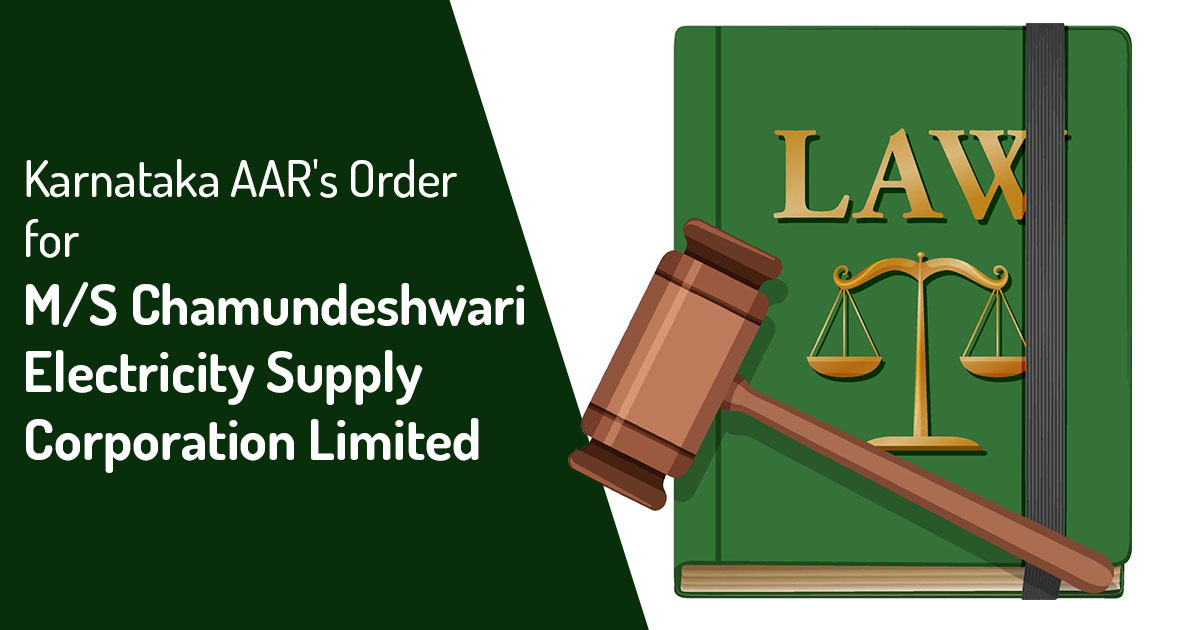
The other surcharge obtained via open-access consumers under section 42 of the electricity act 2003 shall get taxed under the GST act, Karnataka Authority for Advance Ruling (AAR) held.
The two-member bench of M.P. Ravi Prasad and Kiran Reddy T. found that Chamundeshwari Electricity Supply Corporation Limited could not be regarded as a “governmental authority” or a “local authority.”
The applicant is in the business of distributing power and selling energy. It buys power from central and state power plants, major independent power producers, and independent power producers from non-conventional sources such as wind, solar, mini-hydro, Telangana State Power Generation Corporation Limited, Damodar Valley Corporation Limited, and short-term and medium-term co-generators.
In the districts of Mysore, Mandya, Chamarajanagar, Hassan, and Kodagu, the Corporation supplies and distributes power to diverse users like as corporations, industries, commercial establishments, hospitals, farmers, irrigation pumps, people, government organizations, and so on. The retail rate is set by the Karnataka Electricity Regulatory Commission (KERC) in accordance with the Electricity Act of 2003.
On the different problems, the applicant requested an advance ruling.
It does not been clear if the corporation would be acknowledged as a “government authority” or a “local authority”, as the government of Karnataka withheld 99.99% of the equity in the corporation.
The Corporation is exempt from submitting an annual return in Form GSTR-9 and Form GSTR-9C according to the Second Proviso to Section 44 of the CGST and SGST Acts since it is wholly owned by the Government of Karnataka and is audited by the Comptroller and Auditor General of India.
if the business qualifies for an input tax credit for inbound supplies of goods and services that are capitalized in the books of accounts.
Whether the corporation can claim input tax credits on inbound services against taxable output supply of support and auxiliary services and other taxable goods.
As per the requirements of Rules 42 and 43 of the CGST and KGST Regulations, if the corporation is entitled to claim input tax credits (on inputs, input services, and capital goods) proportionally on the taxable output supply of support services and commodities (scrap, etc.).
Input tax credit eligibility for the corporation to claim taxes paid under RCM.
The GST Acts govern whether an Additional Surcharge received from an Open Access Customer is taxable.
The question of whether the “Wheeling and Banking Charges,” which the Commission (KERC) has approved at 5% and 2%, respectively, of the energy input into the distribution system by open access users, are subject to taxation under the GST Acts.
The AAR emphasized that in order to be covered by government power, two requirements must be met. First, it needs to be founded either by a State Legislature or a Parliamentary Act, or it needs to be established by a government that has at least 90% equity or control in it. Second, it must be created or constituted in order to perform any tasks delegated to a panchayat or municipality under Article 243W or 243G of the Constitution, respectively.
Important: Easy Guide to RCM (Reverse Charge Mechanism) Under GST with All Aspects
The first need is met since, according to the applicant, the Government of Karnataka owns 99.99% of the stock in the applicant’s firm, which was founded by the Government of Karnataka. The duties assigned to a municipality are covered under Article 243W of the Constitution and the Twelfth Schedule to the Constitution. The lack of coverage for the provision of power was confirmed. The Constitution’s Article 243G and the Eleventh Schedule deal with the duties assigned to a panchayat. The coverage of rural electrification, including energy distribution, was confirmed. Nevertheless, the applicant firm was not founded or developed specifically to offer rural electricity, therefore the second need is not met.
“Article 243W of the Constitution and the Twelfth Schedule to the Constitution relating to the functions entrusted to a municipality are verified, and it is found that the supply of electricity is not covered. Article 243G of the Constitution and the Eleventh Schedule to the Constitution relate to the functions entrusted to a panchayat. It was verified and found that rural electrification, including the distribution of electricity, is covered. But the applicant company is not set up or established only to provide rural electrification, and hence the second condition is not satisfied,” the AAR said.
The AAR determined that according to section 17(2) of the CGST Act read with Rules 42 and 43 of the CGST Regulations, the applicant is qualified to claim input tax credits (on inputs, input services, and capital goods) proportionally on the taxable output supply of support services and goods (scrap, etc.).
The AAR concluded that the applicant’s “Wheeling and Banking Charges” are exempt from GST payment.
| Name of the Applicant | Chamundeshwari Electricity Supply Corporation Limited |
| Advance Ruling No. | KAR ADRG 09/2023 |
| Date | 17.02.2023 |
| GSTIN No. | 29AACCC6636P1Z1 |
| Represented By | Sri Y.C. Shivakumar, Advocate |
| Karnataka AAR | Read Order |









